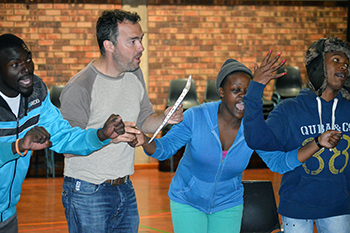Latest News Archive
Please select Category, Year, and then Month to display items
12 January 2024
|
Story Nonsindiswe Qwabe
|
Photo Sonia Small
 Since joining the UFS in 2008, Dr Grey Magaiza has worked extensively on approaches that can foster the socio-economic transformation of societies.
Since joining the UFS in 2008, Dr Grey Magaiza has worked extensively on approaches that can foster the socio-economic transformation of societies.
“The future should be one where communities can decide on their development agenda and futures. That’s the most important for me.” Dr Grey Magaiza, Deputy Director of the Centre for Gender and Africa Studies (CGAS) and Head of the Community Development programme on the Qwaqwa Campus, is passionate about capacitating communities to be agents of change and advancement. His vision for the future emphasises the empowerment of communities to take charge of their development by actively participating in decision making and the implementation of development projects that can improve their lives.
Since joining the UFS in 2008, Dr Magaiza has worked extensively on approaches that can foster the socio-economic transformation of societies. Over the years, he has crafted his research speciality into one that he is most proud of – being an interdisciplinary scientist immersed in the development of communities.
“I’m in a fortunate position of researching what I like. I say ‘fortunate’, because I’ve taken the time to understand what I’m passionate about, which is the overall field of rural livelihoods and livelihood futures – in short, community development. My research starts from an engaged university, understanding the elements that a university must use to enhance transformation and relevance to its immediate community in terms of development.”
One of the ways he has done this is by looking at social entrepreneurship as a development approach for young people in a rural setting. Through workshops with non-profit and civic organisations in Qwaqwa, Dr Magaiza has been helping these organisations to map out their needs and actively meet them through the involvement and support of external role players.
“We understand that communities are part of the national development agenda, but even that national agenda respects community knowledge and intentions and allows communities to shape their identity. A critical enabler of this is community organising. You bring back the capacity in communities to have dialogues on issues affecting them as spaces for engagement, knowledge exchange, and for people to just talk about their way forward.”
By enabling communities to define their development agenda, they can address their specific needs, challenges, and aspirations, he said. “When I look at livelihood futures, it’s quite an exciting aspect of my work – it’s like looking into a fortune tellers’ globe, because you’re not deciding for communities what they should do, but the communities themselves take those decisions.”
I-DENT-I-TIES to shine at the Free State Arts Festival
2016-07-08

Erwin Maas with members of the student cast from the
Qwaqwa Campus. They are, from left: Mpho Xaba,
Lebohang Molefe and Tankiso Mofokeng.
Imagine this: A student cast from a rural campus; Production team consisting of a New York-based Dutch director, a South African screen and stage legend, a The Hague/Vienna-based Dutch theatre designer, and a Vienna-based Serbian performance-craft-artist and designer.
This sounds like a far-fetched flight of the imagination. But it is real and it is called ‘I-DENT-I-TIES’, a large-scale interdisciplinary performance project with international theatre professionals and students from the University of the Free State’s (UFS) Qwaqwa Campus.
According to the director of the project, Erwin Maas, the production explores the ‘dents’ and ‘ties’ of both individual and communal identification and distinctiveness and does this through the famous Basotho story of ‘Moshanyana Sankatana’ as a point of departure.
“We explore questions like ‘what are dents in our society as well as in ourselves’, ‘what ties me to who I really am and who I want to be’, ‘what does it mean to be me’, ‘what does it mean to be South African’,” said Maas, who has been working on this project since last year.
The production also celebrates personal, communal, and universal narratives and identities through song, dance, story-telling, and music. It explores the past, the present, and the future.
“This production will certainly reveal an extraordinary journey into what makes us unique and binds us together,” he added during the rehearsals that started in May at the Qwaqwa Campus.
Maas has teamed up with a well-known South African film and stage legend, Jerry Mofokeng, as consultant. Mofokeng, who introduced Maas to the ‘Sankatana’ story, has featured on a number of critically-acclaimed films that include ‘Cry, The Beloved Country’ as well as the Academy Award-winning ‘Tsotsi’. Maas has also worked with the Hague/Vienna-based Dutch designer Nico de Rooij and Djana Covic, a Vienna-based Serbian designer.
The production is a partnership between the UFS Student Affairs, Vrystaat Arts Festival, the Programme for Innovation in Artform Development, and the Kingdom of the Netherlands in South Africa. It will premiere at the Free State Arts Festival, held in Bloemfontein from 11 to 16 July 2016. This will be followed by a performance at the Qwaqwa Campus on 19 July 2016.